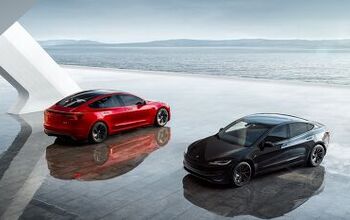European Cartel Probe Suspects German Automakers of Illegal Agreements

While Europe appears infinitely suspicious of German automakers, it hasn’t been nearly as eager to cuff suspects and cart them off to the slammer. Considering how unappealing Japan’s treatment of a former Nissan employee happened to be with the general public (regardless of his guilt/innocence), that’s probably wise. Slow and sure is the ideal strategy for tackling corporate corruption — it just has the unfortunate consequence of dragging everything out.
In 2018, BMW, Daimler, and Volkswagen Group became the focus of an investigation aimed at uncovering illegal cooperation. Allegations going back to 2017 stipulated the three had coordinated on the rollout of clean emissions technology (specifically AdBlue); at the same time, Germany was under heavy scrutiny for the leeway it was giving automakers after VW’s diesel emission scandal. Before long, claims arose that Germany’s manufacturers had been effectively running an automotive cartel for decades, with supporting evidence slowly mounting.
By April of 2019, the European Union Commission accused the companies of engaging in illegal behavior.
“Such market behavior, if confirmed… would violate EU competition rules prohibiting cartel agreements to limit or control production, markets or technical development,” the group said in a release. The trio was obligated to pay a combined total of $110 million in fines for unlawful actions relating to steel purchases in November.
Now, EU Competition Commissioner Margrethe Vestager claims she’ll be able to bust them for similar malfeasances regarding the deployment of exhaust gas cleaning technologies like AdBlue. “We suspect a foul game when it came to using the best technology for emission control or not,” Vestager told the Funke media group, adding that the EU commission always held “strong doubts.”
According to Germany’s Automobilwoche (an extension of Automotive News), Vestager wants to be careful not to issue any definitive statements. The EU may suspect the crap out of die großen drei, but it wants to be sure it can win any courtroom battles before it issues any formal charges. This all hinges on determining whether or not the automakers’ cooperation actually helped customers — which may be easier said than done.
Legally, German automakers can conspire quite a bit if it’s for the betterment of mankind — and the particulate filters and diesel exhaust fluid reservoirs under investigation are technically there to help clean up the environment. But VW has said the same thing about the software at the center of its 2015 emission scandal, which was eventually found by the U.S. Department of Justice to be an intentionally deceptive way to skirt testing procedures. The automaker still occasionally uses that excuse in European civil cases. We’re inclined to believe the EU has already made up its mind, however.
April’s accusations from the European Commission were pretty clear cut:
Commissioner Margrethe Vestager in charge of competition policy said: “Companies can cooperate in many ways to improve the quality of their products. However, EU competition rules do not allow them to collude on exactly the opposite: not to improve their products, not to compete on quality. We are concerned that this is what happened in this case and that Daimler, VW and BMW may have broken EU competition rules. As a result, European consumers may have been denied the opportunity to buy cars with the best available technology. The three car manufacturers now have the opportunity to respond to our findings.”
The Commission’s preliminary view is that BMW, Daimler and VW participated in a collusive scheme, in breach of EU competition rules, to limit the development and roll-out of emission cleaning technology for new diesel and petrol passenger cars sold in the European Economic Area (EEA). This collusion occurred in the framework of the car manufacturers’ so-called “circle of five” technical meetings.
The Commission’s preliminary view was that BMW, Mercedes-Benz, Volkswagen, Audi, and Porsche intentionally tried to restrict competition on innovation for emission cleaning systems and effectively denied consumers the ability to purchase less polluting cars despite there being superior technology available to all manufacturers. It’s not quite overt price fixing, but it’s not quite legal, either. The antitrust investigation will continue, with unconfirmed rumors of formal charges being worked up for the start of 2020. If true, the German automakers could find themselves facing billions in punitive fines.
[Image: Olrat/Shutterstock]

A staunch consumer advocate tracking industry trends and regulation. Before joining TTAC, Matt spent a decade working for marketing and research firms based in NYC. Clients included several of the world’s largest automakers, global tire brands, and aftermarket part suppliers. Dissatisfied with the corporate world and resentful of having to wear suits everyday, he pivoted to writing about cars. Since then, that man has become an ardent supporter of the right-to-repair movement, been interviewed on the auto industry by national radio broadcasts, driven more rental cars than anyone ever should, participated in amateur rallying events, and received the requisite minimum training as sanctioned by the SCCA. Handy with a wrench, Matt grew up surrounded by Detroit auto workers and managed to get a pizza delivery job before he was legally eligible. He later found himself driving box trucks through Manhattan, guaranteeing future sympathy for actual truckers. He continues to conduct research pertaining to the automotive sector as an independent contractor and has since moved back to his native Michigan, closer to where the cars are born. A contrarian, Matt claims to prefer understeer — stating that front and all-wheel drive vehicles cater best to his driving style.
More by Matt Posky
Latest Car Reviews
Read moreLatest Product Reviews
Read moreRecent Comments
- Calrson Fan We are already seeing multiple manufacturers steering away from EVs to Hybrids & PHEVs. Suspect the market will follow. Battery tech isn't anywhere close to where it needs to be for EV's to replace ICE's. Neither is the electrical grid or charging infrastructure. PHEV's still have the drawback that if you can't charge at home your not a potential customer. I've heard stories of people with Volts that never charge them but that's a unique kind of stupidity. If you can't or don't want to charge your PHEV then just get a hybrid.
- AZFelix The last time I missed the Malibu was when one swerved into my lane and I had to brake hard to avoid a collision. 1 out of 5⭐️. Do not recommend.
- 2ACL I won't miss it; it was decent at launch, but in addition to the bad packaging, GM did little to keep it relevant in the segment. I'd prefer that another domestic automaker doesn't just give up on the mainstream sedan, but unlike some of Ford's swan songs, the Malibu made an indifferent case for why they should live.
- ToolGuy TG grows weary of purchasing gasoline. I don't care so much how or why, I am just tired of it. I still buy petroleum products, not 'boycotting oil,' but backing away from gasoline where I can. Sample size = 1.
- Probert Maybe it's not too late for the Dodge Neon I've always dreamed of!!! To the keyboard Robin!


































Comments
Join the conversation
Manufacturers do the minimum to meet regulations. They know that regulators will require constant improvements. Ever wonder why we don't use solenoids to operate engine valves? A Ford engineer told me because they are saving it for when it becomes necessary. They can meet current rules without it. If they did everything they can today, the governments would still expect an improvement next year that would no longer be possible.
Corruption is in the nature of Socialism. EU arguments and actions against German companies and BTW American tech companies as well are very Orwellian. The real problem is that socialist countries of Europe as well as whole EU simply cannot compete with Silicon Valley - we are talking here about just part of one US state (California) and apparently with Germany as well so come up with absurd demands in attempt to remove competition. Of course they will fail - Germans will crush French and Italian competition and EU will never be technologically equal to US.